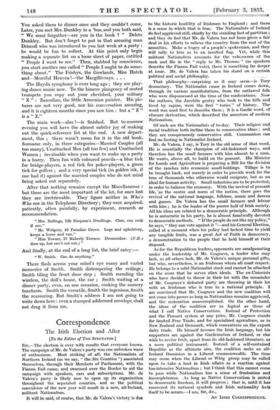Correspondence
The Irish Election and After
[To the Editor of THE SPECTATOR.] Sia,—The election is over with results that everyone knows. The campaign of Mr. de Valera's party was one unbroken wave of enthusiasm. Most striking of all, the Nationalists of Northern Ireland (as we say, " the Six Counties ") associated themselves, through their Members of Parliament, with the Fianna Fail cause, and swarmed over the Border to aid the campaign with speakers, cars and subscriptions. Mr. de Valera's party is likely now to open up its organization throughout the separated counties, and so the political convulsion of the new year will result in a new, all-Ireland, militant Nationalism.
It will be said, of course, that Mr. de Valera's victory is due to the historic hostility of Irishmen to England ; and there is a sense in-which that is true. The Nationalists of Ireland do feel aggrieved still, chiefly by the standing fact of partition ; and they do feel that Mr. de Valera has not been given a fair deal in his efforts to relieve the country from the cost of the annuities. Make a bogey of a people's spokesman, and they will rally to him as to an insulted flag. Yet, while this militant Nationalism accounts for the vehemence of the rank and file in the " reply to Mr. Thomas " (as speakers describe the Fianna Fail vote), there is something far deeper at issue. Mr. de Valera has taken his stand on a .ceictain political and social philosophy.
That philosophy—surprising as it may seem—is Tory democracy. The Nationalist cause in Ireland comes down, through its various manifestations, from the outlawed folk who were dispossessed at the time of the confiscations. Now the outlaws, the Jacobite gentry who took to the hills and lived by rapine, were the first " tories " of history. The word was used first to describe them ; it is a Gaelic word, of obscure derivation, which described the ancestors of modern Nationalism.
Of such are the Nationalists of to-day. Their religion and racial tradition both incline them to conservative ideas ; and they are conspicuously consen•ative still. Communism can find no footing in Nationalist Ireland.
Mr. de Valera, I say, is Tory in the old sense of that word. He is essentially the champion of old-fashioned ways, and therefore has the small farmers with him almost to a man. He wants, above all, to build on the peasant. His Minister for Lands and Agriculture is preparing a Bill for the division of the ranches into economic small-holdings. Tillage is to be brought back, not merely in order to provide work for the tens of thousands who otherwise would emigrate, but as an ideal for human activity. Small industries are to be protected, in order to balance the economy. With the revival of peasant life, 'as the centre and norm of the nation, there goes the revival of the national language, folklore, music and dances and games. De Valera has the small farmers and labour with him ; he is the leader of the poorer half of Irish society. All his ideas are related to a democratic principle. Although he is autocratic in his party, he is almost fanatically devoted to democratic methods. " If the people do not like my policy," he says, " they can vote against it "—and his General Election, called at a moment when his policy had lacked time to yield any tangible fruits, was a great Act of Faith in democracy, a demonstration to the people that he held himself at their disposal.
As for the Republican leaders, opponents are amalgamating under the leadership of Mr. Cosgrave, a leader who may lack, as all others lack, Mr. de Valera's unique personal gifts, but who, nevertheless, is an Irishman whom all must respect. He belongs to a solid Nationalist stock and cannot be attacked on the score that -he serves alien ideals. The ex-Unionists who have decided to throw in their lot with the remainder of Mr. Cosgrave's defeated party are throwing in their lot with an Irishman who is true to a national principle. I am convinced that Mr. Cosgrave and the new coalition will not come into power as long as Nationalism remains aggrieved, and the restoration unaccomplished. On the other hand, the ideas of the coalition are as logical as those of what I call Native Conservatism. Instead of Protection and the Peasant system at any price, Mr. Cosgrave stands for limited Free Trade, and for specialized agriculture, as in New Zealand and Denmark, which concentrate on the export dairy trade. He himself favours the Irish language, but his supporters are against the Gaelicization of Ireland, or else wish to revive Irish, apart from its old-fashioned literature, as a mere political instrument. Instead of a self-contained Republic as the ultimate aim, the coalition seeks an all4 Ireland • Dominion in a Liberal commonwealth. The time may some when the Liberal. or Whig group may be called upon to .take a lead in Irish affairs as a reaction against too-intensive Nationalism ; but I think that this cannot come to pass while Nationalism has a sense of frustration and incompleteness. As long as Native Conservatism is united to democratic freedom, it will progress ; that is, until it has recovered its national symbols and Irish nationality feels itself to be secure.—I am, Sir, &c., AN- buss Coarmsromms-r.




































 Previous page
Previous page